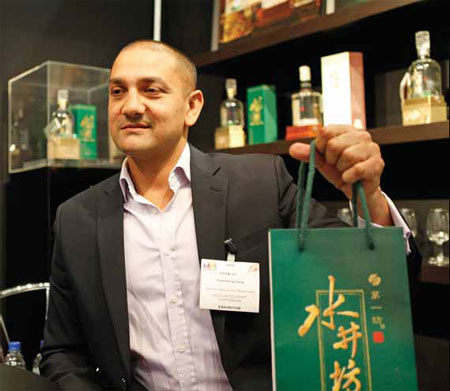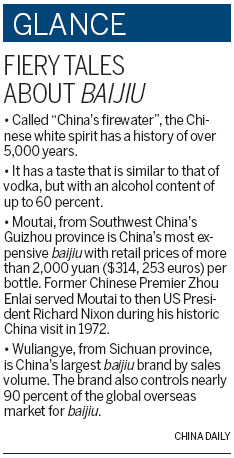Toast of the town
Updated: 2012-06-01 11:03
By Cecily Liu and Zhang Haizhou (China Daily European Weekly)
|
|||||||||||
Chinese white spirit producers enjoying a fresh surge in popularity in Europe
After ruling the roost at home, China's fiery white spirit baijiu is gaining popularity in overseas markets on rising demand from Chinese travelers and more Western businessmen keen on doing business in China.
Evidence of the growing popularity of the fiery drink is visible in the ample stocks of baijiu that are being purchased by popular supermarket chains in Britain.
 |
|
Diageo's Sheyan Patel says Shui Jing Fang has received good feedback in the European market.[Zhang Bin / China Daily] |
Global drinks major Diageo PLC, which recently acquired a controlling stake in Chinese spirit maker Sichuan Swellfun Co Ltd, the company that makes Shui Jing Fang baijiu, has been at the forefront of the campaign to drum up overseas support for the white spirit.
Later this month, the London-based company will bring its Shui Jing Fang brand to Britain even as it seeks to make further inroads in markets like the Netherlands, Belgium and Germany, where the baijiu debuted in January.
The International Wine Fair held in London from May 22-24 had for the first time a baijiu pavilion, which also offered visitors a chance to taste the Chinese white spirit.
"The market feedback (for baijiu) has been very strong," says Sheyan Patel, part of the team that looks after Shui Jing Fang sales at Diageo.
Asian Food Express, the distributor of Shui Jing Fang in European markets, has just finished selling its first bulk order for the baijiu and is now executing another one, Patel says, without revealing the order value or size.
He says the second Asian Food Express order includes all the four products in the Shui Jing Fang range, while the first order was just the cheapest one, the Shui Jing Fang Wellbay.
Wellbay, still considered a super-premium baijiu in China, has a price tag of around 858 yuan ($135, 107 euros) for a 500-milliliter bottle.
Prices in Europe are a tad higher because of import duties, Patel says. The other three products are the Forest Green, the Scholar's edition and the Classic.
With Britain being Diageo's home market, the company also has extensive knowledge of local customers and a huge sales network to boost baijiu sales.

"It would be much more easier for companies like Diageo to push baijiu sales through the mainstream British retailers like Tesco," says Neil Cao, international business director at Diageo.
But even so, Cao admits that Shui Jing Fang's current complex taste and high alcohol content may not exactly suit the Western consumer, an obstacle that Diageo hopes to overcome in the long run with product innovation.
There are also considerable negative vibes for baijiu in the West and it has often been likened to "firewater" or "paint thinner" because of its heat. With a taste similar to that of vodka, baijiu has alcohol content levels of up to 60 percent.
But unlike vodka, the grain-based distilled spirit is unsuitable for cocktails as its strong flavor overshadows all the other ingredients in the mix, Cao says.
Shui Jing Fang will initially look to connect with the Chinese diaspora in Britain and will be distributed by oriental food wholesaler SeeWoo.
Apart from SeeWoo, limited selections of baijiu are also being sold at other leading Chinese supermarkets in the United Kingdom. Erguotou, a cheap but popular baijiu brand from northern China, for example, can be easily found in almost every Chinese supermarket in London's Chinatown.
Although Shui Jing Fang is relatively new in Europe, it is already an important player in some overseas markets like the US, Australia, Japan, South Korea, Singapore and Canada, Patel says.
International sales accounted for just 10 percent of the total sales last year at Shui Jing Fang, but the brand is facing growing competition from other Chinese white spirits.
Moutai, an expensive baijiu with sale prices of more than 2,000 yuan for a 500-ml bottle, has already debuted at the duty-free shops in several international airports as part of an alliance with French company Camus Wine Group.
The French company stocked as much as 120,000 bottles of Moutai in 2008, a tenfold increase from 2004. Annual sales of Moutai in international duty-free shops are expected to reach $15 million (11.9 million euros) by 2014, which is nearly double the 2008 figure of $7.5 million.
Wuliangye, China's largest baijiu brand by sales volume enjoyed more than 90 percent share of the global baijiu market in 2011.
The group has also invested heavily in marketing in the US, including the famous Times Square 60-foot LED billboard advertisement, which costs $400,000 a month.
Following closely behind is the Moet Hennessy-controlled Wenjun, currently available in most of the Asia-Pacific international airports, and slated to debut in European airports later this year.
Indeed, the overseas market for baijiu seems to be booming. "No liquor no feast", is an old Chinese saying that also seems to be the core of the global moves by several Chinese companies.
Among the visitors at the International Wine Fair last month was Dawn Davies, wine and spirit buyer at Selfridges, a luxury department store in London.
"I think it's interesting. It's something we'll start to see a bit more of a demand for," she says.
An article in a trade magazine last year sparked her interest in the Chinese drink, and since then she has been studying the possibility of selling baijiu at Selfridges.
"The food culture in the UK is that people like experimenting. So why not?"
Although she couldn't pick out a favorite taste after sampling the various brands, she says that the baijiu brand Jiannanchun's packaging - a tall red bottle combined with a golden lid - impressed her.
"The vivid red just really stood out, and it's important to pick the color with the right cultural connotations," she says, explaining that both the taste and packaging of the Chinese white spirit are important.
However, some baijiu brands are still looking to grow sales in the domestic market.
Another Chinese baijiu brand Tuo Pai, which began selling its white spirit in foreign markets as early as the 1980s, decided to stop most of its overseas sales in 2005 and focus on the domestic market.
"Back then, the international demand for baijiu was not very high, but China's middle-class consumers were getting richer and richer, so we went for the opportunity," says Zhu Yingcai, deputy manager of Tuo Pai's sales department.
Tuo Pai's decision was hardly surprising, given that China's annual baijiu exports accounted for only 0.04 percent of the total production in 2010, according to information provided by trade magazine China Wine News.
Another report from Euromonitor, a London-based market intelligence firm, said that 4 billion liters of baijiu were sold in China last year, compared to just 80 million liters of international spirits.
Euromonitor estimates that China's baijiu consumption will increase by another billion from 2012 to 2017, especially in the super-premium category, where the profit margins can be as high as 80 percent.
It is precisely this increasing demand for luxury baijiu that has motivated Tuo Pai's re-branding in recent years, much of which relied on the introduction of a new product range rooted in Taoism philosophy, called She De.
To explain the difference, Zhu says that Tuo Pai was selling one of its best products in Europe for 10 euros prior to its exit in 2005. But She De now sells for the equivalent of 100 euros in China.
The price hike did not deter Tuo Pai's sales, however. Last year, Tuo Pai's super-premium product range achieved a 90-percent growth, and its mid-range products saw a 130-percent growth.
Going forward, Tuo Pai will certainly look for suitable global opportunities, but only when the timing is right, he says.
"Baijiu is not just a product, but a projection of China's thousands of years of history. One day when our culture is appreciated globally like Western culture is in China, baijiu will then become popular overseas like whisky and wine are in China today," he says.
Contact the writers at cecily.liu @chinadaily.com.cn and zhanghaizhou@chinadaily.com.cn
Today's Top News
President Xi confident in recovery from quake
H7N9 update: 104 cases, 21 deaths
Telecom workers restore links
Coal mine blast kills 18 in Jilin
Intl scholarship puts China on the map
More bird flu patients discharged
Gold loses sheen, but still a safe bet
US 'turns blind eye to human rights'
Hot Topics
Lunar probe , China growth forecasts, Emission rules get tougher, China seen through 'colored lens', International board,
Editor's Picks

|

|

|

|

|

|





